大学英语综合教程第二册第二单元教案Unit 2
- 格式:doc
- 大小:55.50 KB
- 文档页数:6
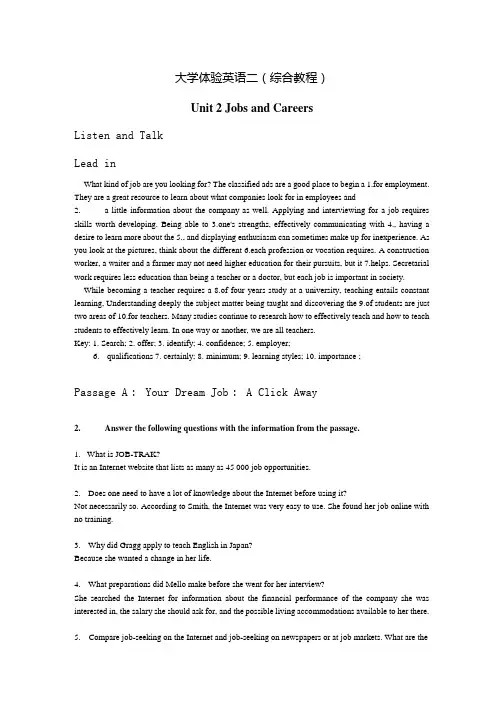
大学体验英语二(综合教程)Unit 2 Jobs and CareersListen and TalkLead inWhat kind of job are you looking for? The classified ads are a good place to begin a 1.for employment. They are a great resource to learn about what companies look for in employees and2. a little information about the company as well. Applying and interviewing for a job requires skills worth developing. Being able to3.one's strengths, effectively communicating with4., having a desire to learn more about the5., and displaying enthusiasm can sometimes make up for inexperience. As you look at the pictures, think about the different6.each profession or vocation requires. A construction worker, a waiter and a farmer may not need higher education for their pursuits, but it7.helps. Secretarial work requires less education than being a teacher or a doctor, but each job is important in society.While becoming a teacher requires a 8.of four years study at a university, teaching entails constant learning, Understanding deeply the subject matter being taught and discovering the 9.of students are just two areas of 10.for teachers. Many studies continue to research how to effectively teach and how to teach students to effectively learn. In one way or another, we are all teachers.Key: 1. Search; 2. offer; 3. identify; 4. confidence; 5. employer;6.qualifications7. certainly;8. minimum;9. learning styles; 10. importance ;Passage A: Your Dream Job: A Click Away2.Answer the following questions with the information from the passage.1.What is JOB-TRAK?It is an Internet website that lists as many as 45 000 job opportunities.2.Does one need to have a lot of knowledge about the Internet before using it?Not necessarily so. According to Smith, the Internet was very easy to use. She found her job online with no training.3.Why did Gragg apply to teach English in Japan?Because she wanted a change in her life.4.What preparations did Mello make before she went for her interview?She searched the Internet for information about the financial performance of the company she was interested in, the salary she should ask for, and the possible living accommodations available to her there.pare job-seeking on the Internet and job-seeking on newspapers or at job markets. What are thestrengths and limitations of each?Answer: Open.3.Choose the best answer to each question based on the information you obtain from the passage.1.Which of the following best summarizes the main idea of the passage?A)The Internet can help one find an overseas job.B)The Internet can give one information about all companies.C)One can find a better job with the help of the Internet.D)There are many employment websites one can turn to for help.2."To click one's way into a job*' means.A)to find a job by searching the InternetB)to get a job by clicking a mouseC)to access the job websiteD)to know the way to do one's job3.It can be inferred that .A)originally only job vacancies in high-tech fields were listed on the InternetB)most newspapers and publications don't have a section of classified listingsC)many companies are using the Internet as their management assistantsD)many people can get a job offer now without going through an interview4.Dozlic found a better job.A)while browsing a website for baseball tradesB)by casually checking out an online classified adC)because of his curiosity about the InternetD)because of the experience he obtained from other jobs5.Mello searched the Internet for all the following information except.A)job vacanciesB) a company's financial performanceC)the minimum salaryD)rental propertiesAnswer: l.C, 2.A, 3.A, 4.A, 5.C4.Fill in the blanks with the words given below. Change the form where necessary.1.I'm absolutely sure that this dress is a cheaper of the one we saw in that department store.2.The bookshelves were crowded with books and scientific.3.If you want to open a file,twice on the icon (图标)for it.4.To their disappointment, the thieves were by the police at the moment they were entering the bank.5.During World War II, many fled to the United States.6.They*ve updated(更新)a lot of in the most recent edition of the dictionary.7.Despite difficulties,they did not find the life in London unpleasant.8.After a lot of part-time jobs, John finally got a position.9.In your report, you should give a description of the whole incident.panies publish reports to inform the public about the previous year's activitiesAnwser: 1 .version, 2.publications, 3.click, 4. spotted, 5.refugees,6.entries,7.financial,8.full-time,9. detailed,lO.annualplete the following sentences with phrases or expressions from the passage.Change the form where necessary.1.At the age of 29, he a commercial property business.2.While she was tidying up the living room, she her old photograph album.3.My doctor me a specialist in heart disease.4.He hired private investigators to his future business partner.5.She only her son's marriage long after the event.Answer: l.set up, 2.came across, 3.referred...to , 4.check out, 5.learnt of / learned of6.Choose an appropriate noun given in the following box to complete each of the sentences.1.She is now concentrating on a/an ___ as a fashion designer.2.When I went for my first __ for this job I arrived extremely early.3.Police insisted that Michael did not follow the correct in applying for a visa.4.We organized a/an of recent book upon constant requests from the readers.5.The newspaper publishes a/an of a leading sportsman every week.Answer: 1 .career 2. interview 3.procedure 4.exhibit 5.profile7.Translate the following sentences into English.1.警察们正忙着填写关于这场事故的各种表格。
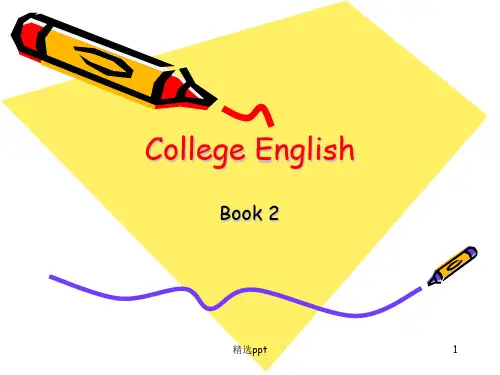
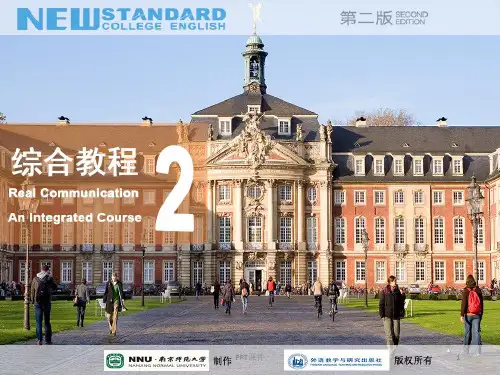
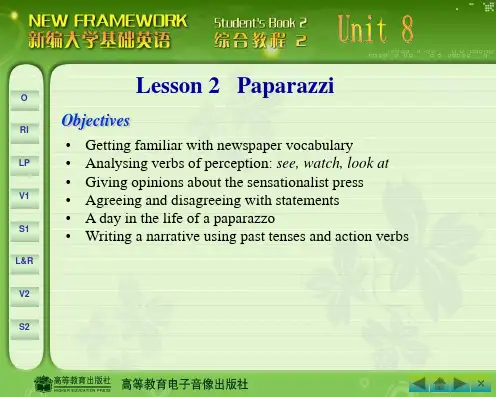
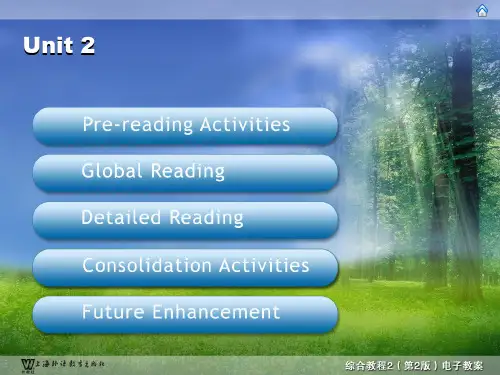
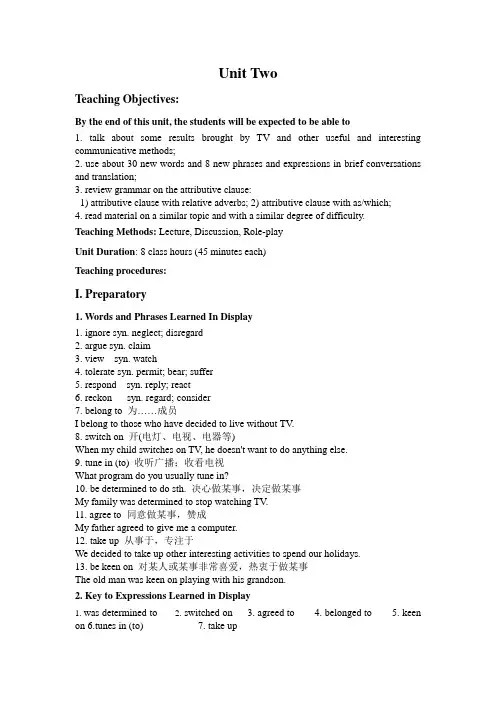
Unit TwoTeaching Objectives:By the end of this unit, the students will be expected to be able to1. talk about some results brought by TV and other useful and interesting communicative methods;2. use about 30 new words and 8 new phrases and expressions in brief conversations and translation;3. review grammar on the attributive clause:1) attributive clause with relative adverbs; 2) attributive clause with as/which;4. read material on a similar topic and with a similar degree of difficulty.Teaching Methods: Lecture, Discussion, Role-playUnit Duration: 8 class hours (45 minutes each)Teaching procedures:I. Preparatory1. Words and Phrases Learned In Display1. ignore syn. neglect; disregard2. argue syn. claim3. view syn. watch4. tolerate syn. permit; bear; suffer5. respond syn. reply; react6. reckon syn. regard; consider7. belong to 为……成员I belong to those who have decided to live without TV.8. switch on 开(电灯、电视、电器等)When my child switches on TV, he doesn't want to do anything else.9. tune in (to) 收听广播;收看电视What program do you usually tune in?10. be determined to do sth. 决心做某事,决定做某事My family was determined to stop watching TV.11. agree to 同意做某事,赞成My father agreed to give me a computer.12. take up 从事于,专注于We decided to take up other interesting activities to spend our holidays.13. be keen on 对某人或某事非常喜爱,热衷于做某事The old man was keen on playing with his grandson.2. Key to Expressions Learned in Display1. was determined to2. switched on3. agreed to4. belonged to5. keen on6.tunes in (to)7. take upII. Language in Context1. Preview Questionsi. Do you like watching TV? And what kind of TV programs do you usually watch? ii. If one day you don't watch TV any more, what else can you do?iii. What is your attitude towards TV?2. Information Related To the Texti. TelevisionTelevision is a telecommunication system for broadcasting and receiving moving pictures and sound over a distance. The term has come to refer to all the aspects of television programming and transmission as well. The word television is a hybrid word, coming from both Greek and Latin. “Tele-” is Greek for “far,” while “-vision” is from the Latin “visio,” meaning “vision” or “sight.” It is often abbreviated as TV.The earliest television sets were radios with the addition of a television device consisting of a neon tube with a mechanically spinning disk (the Nipkow disk, invented by Paul Gottlieb Nipkow) that produced a red postage-stamp size image. The first publicly broadcast electronic service was in Germany in March 1935. It had 180 lines of resolution and was only available in 22 public viewing rooms. One of the first major broadcasts involved the 1936 Berlin Olympics. The Germans had a 441-line system in the autumn of 1937.Television usage skyrocketed after World War II with war-related technological advances and additional disposable income. Prior to the war, in the 1930s, TV receivers cost the equivalent of US$7000 in 2001, and had little available programming.For many years different countries used different technical standards. France initially adopted the German 441-line standard but later upgraded to 819 lines, which gave the highest picture definition of any analogue TV system, approximately four times the resolution of the British 405-line system. Eventually the whole of Europe switched to the 625-line standard, once more following Germany’s example. Meanwhile in North America the original 525-line standard was retained.A television with a VHF “rabbit ears” antenna and a loop UHF antenna. Television in its original and still most popular form involves sending images and sound over radio waves in the VHF and UHF bands, which are received by a receiver (a television set). In this sense, it is an extension of radio. Broadcast television requires an antenna (aerial). This can be an external antenna mounted outside or smaller antennas mounted on or near the television. Typically this is an adjustable dipole antenna called “rabbit ears” for the VHF band and a small loop antenna for the UHF band.Color television became available in the U.S. on December 30 of 1953, backed by the Columbia Broadcasting System (CBS) network. The government approved the color broadcast system proposed by CBS, but when RCA came up with a subcarrier system that made it possible to view color broadcasts in black and white onunmodified old black and white TV sets, CBS dropped their own proposal and used the new one (see NTSC).The first publicly announced experimental TV broadcast of a program using RCA’s “compatible color” system wa s an episode of Kukla, Fran and Ollie on August 30, 1953. NBC was the first network to have a regularly scheduled color program on the air (Bonanza, started in 1959).Television was not invented by a single inventor, instead many people working together and alone, contributed to the evolution of TV.ii. Television JunkiesJunkie is someone who is so ardently devoted to something that it resembles an addiction; “a golf addict;” “a car nut;” “a news junkie.” Television junkies refer to the people who are addicted to watching television without doing anything else. According to scientific research, the conditions of TV viewing cause a physiological high, much in the same way as all those other less socially acceptable forms of drug use.iii. CartoonA cartoon is a form of art with diverse origins and even more diverse modern meanings. In its historical original meaning, a cartoon is a full-size drawing made on paper as a study for a further artwork, such as a painting. However, cartoons were typically used in the production of frescoes in order to accurately link the component parts of the composition when painted onto newly applied fresh plaster over a series of days. Cartoons by painters such as Raphael and Leonardo da Vinci are highly prized in their own right.Nowadays a cartoon is a humorous drawing of some description. This usage dates from the 1840s when Punch magazine applied the terms to satirical drawings in its pages. The first of these parodied frescoes in the then-new Palace of Westminster. The original title for such drawings in Punch was Mr Punch’s Pencillings and the title “cartoon” was intended to be ironic—these were still essentially line-art drawings in pencil and/or ink.Over time, more cartoons in Punch made other satirical points and, eventually, came merely to be humorous drawings, usually (although not always) with a punchline caption at the bottom. Many early examples of these are reproduced on the Punch website and are impenetrably obscure by today’s standards.The modern understanding of “cartoon” falls into two further categories—comic strips and animated cartoons.Comic strips are found daily in newspapers worldwide and are frequently compiled into books. Animated cartoons are usually shown on television or cinema screens and are created by drawing thousands of individual drawings which are shown rapidly in succession to give the impression of movement.3. Language Points1. I belong to one of the two per cent of British families who have decided to live without a television set.belong to1) be a member of 为……成员Which party do you belong to?你属于哪一个党派?I belong to the music club on our campus.我是校园音乐俱乐部的成员。
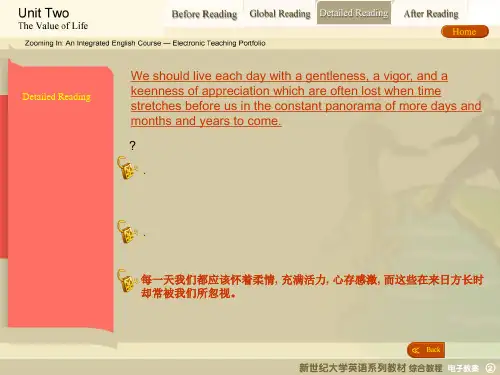
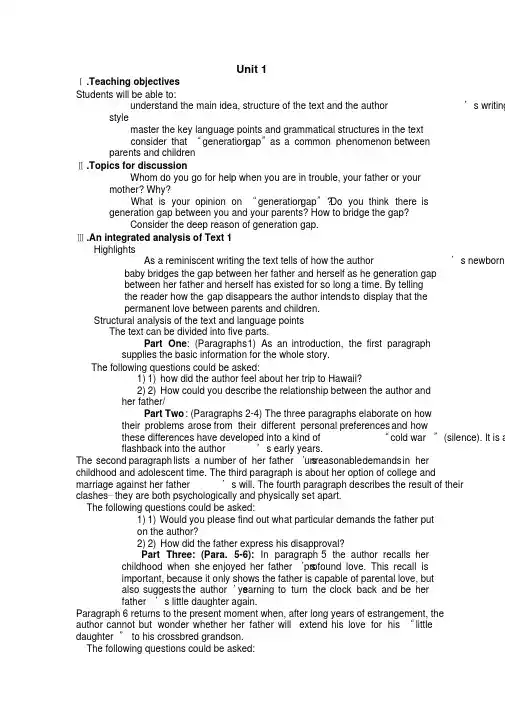
Unit 1Ⅰ.Teaching objectivesStudents will be able to:understand the main idea, structure of the text and the author’s writing stylemaster the key language points and grammatical structures in the textconsider that “generation gap” a s a common phenomenon betweenparents and childrenⅡ.Topics for discussionWhom do you go for help when you are in trouble, your father or yourmother? Why?What is your opinion on “generation gap”? Do you think there isgeneration gap between you and your parents? How to bridge the gap?Consider the deep reason of generation gap.Ⅲ.An integrated analysis of Text 1HighlightsAs a reminiscent writing the text tells of how the author’s newborn baby bridges the gap between her father and herself as he generation gapbetween her father and herself has existed for so long a time. By tellingthe reader how the gap disappears the author intends to display that thepermanent love between parents and children.Structural analysis of the text and language pointsThe text can be divided into five parts.Part One: (Paragraphs 1) As an introduction, the first paragraphsupplies the basic information for the whole story.The following questions could be asked:1)1)how did the author feel about her trip to Hawaii?2)2)How could you describe the relationship between the author andher father/Part Two: (Paragraphs 2-4) The three paragraphs elaborate on howtheir problems arose from their different personal preferences and howthese differences have developed into a kind of “cold war”(silence). It is aflashback into the author’s early years.unreasonable d emands in herThe second paragraph lists a number of her father’schildhood and adolescent time. The third paragraph is about her option of college andmarriage against her father’s will. The fourth paragraph describes the result of their clashes—they are both psychologically and physically set apart.The following questions could be asked:1)1)Would you please find out what particular demands the father puton the author?2)2)How did the father express his disapproval?Part Three: (Para. 5-6):In paragraph 5 the author recalls herprofound love. This recall ischildhood when she enjoyed her father’simportant, because it only shows the father is capable of parental love, butyearning to turn the clock back and be heralso suggests the author’sfather’s little daughter again.Paragraph 6 returns to the present moment when, after long years of estrangement, theauthor cannot but wonder whether her father will extend his love for his “littledaughter” to his crossbred grandson.The following questions could be asked:1) Is the author prepared for the worst?Part four: (Para. 7-13):These paragraphs concern about theobservation about the initial reaction of her parents in theirauthor’saffection for his grandson is described inreunion, and the father’sparagragh10-11, the next two paragraphs come to be aware of heraders can naturally expect the tension tofather’s real state of mind and remelt slowly during the rest of the author’s stay.Part five: (Para. 14-15):These two paragraphs serve as aconclusion of the story. The author depicts the profound emotionalattachment between her father and her son in the following years—theircompanionship in the plays and the old man’s frequent visits to NewYorkThe following questions could be asked:What does it mean by “…trailed by a different, bouncing shadow”?Ⅳ.Language pointsApprehension1)anxiety about the future, expectation of something unpleasantE.g. We waited for their with a great of apprehension.2) apprehensive adj.E.g. I must admit that before my baby was born I was apprehensive aboutmotherhoodStern1)serious, strict, severeE.g. the college principal was a stern old Scotsman called Mr. Fraser.2)sternly adv.E.g. When she did not answer he said sternly and coldly, “Do you understandme?”Femininetypical of a woman, especially in a way that is graceful or attractiveE.g. Nowadays many women rejected the old feminine roles of wife andmother.E.g. “How did you know I was lying?”“Call it feminine intuition”MingleTo mix so as to form an individual whole, while keeping separate qualitiesE.g. As I spoke his expression was one of amazement mingled with fury.E.g. She mingle tradition and originality in her design.Follow in someone’s footstepTo follow an example set by someone in the pasteps and go to the same schoolE.g Charles’s children will follow in his footstMarry into(a family or a social class)To become a member of a certain family or social class by marriageE.g. The only reason Camilla has so much money is that she married onto thearistocracy.Subsequent1) following or happening afterE.g. In subsequent lessons the teacher made clear what she had said at thebeginning.2) subsequently adv.E.g. They started their research using a method which was subsequentlyproved to be unsatisfactory.Estrangement1)causing (esp. people in a family) to become unfriendly towards each other.E.g. His estrangement from his brothers and sisters made his wife andchildren.2)estrange v.E.g. Steve became increasingly estranged from his wife and children.FloodTo arrive at (in) large numbersE.g. Requests for information flooded in after the advertisement.E.g. Tourists flooded into the city.TiptoeTo walk on tiptoe to avoid making any noiseE.g they tiptoed from room to room, afraid to speak above a whisper.GleefullyIn such a way as showing great joy and satisfactionE.g. The children are playing gleefully in the gardenUniform1)the same or consistent, as from example to example or from place to place;constantE.g The are-conditioning system maintains a uniform temperature throughoutthe building2)uniformity n.E.g. most modern housing developments show a tedious uniformity ofdesign.Ⅴ. Questions for considerationHow to bridge the generation gap between parents and children?Ⅵ. Main idea of Text 2The writer used to be very much attached to her mother, who, she thought, wasthe one to hold them together. Assuming no one could ever replace her mother afterher death, the writer found, little by little, to her surprise, that she and father hadmore in common than she had ever imagined. And her father’s deep love for her made her realize that he had become her new Mum. From the whole story we knowith a lovely sense of that the writer’s father is a devoted husband and a fond father whumor. He was also sentimental, sensitive and understanding.Topics for discussion:1)1)What kind of man is the writer’s father?2)2)Explain the title “My New Mum Is …My Dad”.3)3)Whom are you more sentimentally attached to, your father or yourmother? Why?Unit 2I.Teaching objectivesStudents are supposed to:grasp the author’s purpose of writing and make clear the structure of the whole passage through an intensive reading of Text 1.appreciate the fluid and sensual writing style and master the keylanguage points and grammatical structures in the Text 1know how a good relationship between teachers and students buildII.Topics for discussionHave you ever been in a situation where you were considered “different from others? How did you feel?Who is your favorite teacher? What do you remember him/her for?What qualifications do you expect of a good teacher?III.An integrated Analysis of Text 1HighlightsThe teacher’s general impression about the student named Teddy was not so good, while the turning point of the whole story is a Christmas presentgiven to the teacher by Teddy, it made the teacher moved so much. Theteacher gave special care and encouragement to Teddy, which changed hisattitudestudy and life a lot. This text is to tell the readers how a teacher’stowards a pupil can affect his/her life.Structural analysis of the text and language pointsThe passage can be divided into five parts.Part One: (Paragraphs 1-5) The first three paragraphs describe Mrs.Thompson’s initial unpleasant impression about Teddy. This impression) and hercomes from her contact with the boy(“slumped in the his seat”pervious observations (“his clothes were unkempt and that he constantlyneeded a bath. And teddy was unpleasant”).Mrs. Thompson promises to love them all the same, and treat them all alike, but asis proved later, it is not true. She does not like Teddy at first, but she gives particularcare and attention to him.In paragraph 4and 5, Mrs. Thompson’s impression is confirmed by Teddy’s school work during the first few months.Part Two: (Paragraphs 6-8) These paragraphs tell the readers what Mrs.Thompson learned from Teddy’s records.The three teachers’ comments on Teddy present a picture of Teddy’s gradual chang “…he is a joy to be around”, “…his home life will soon affect him…”, “Teddy iswithdrawn… He is tardy and could become a problem.”Mrs. Thompson was somewhat surprised when she read Teddy’s file, she realized she had the duty to do something about it.Part Three: (Para. 9-12): Here we come to the most important part ofthe story, because what happened before Christmas prompted Mrs. Thompsonto do something for Teddy. The students began to laugh when their teacheropened the present given by Teddy, because they thought the present was uglytand worthless. Mrs. Thompson knew that the other kids’ laughter could hurTeddy, and she put on the bracelet and dab some perfume on her wrist in orderto show that she liked Teddy’s present. She was deeply touched by Teddy’words and the way he uttered them, which made her realize how desperatelythe boy needed love and care his mother used to give him.Part Four: (Para.13-14):These two paragraphs describe the changes in both Mrs. Thompson and Teddy after Christmas.The following questions could be asked:1)1)What change did Mrs. Thompson make in her teaching?2)2)What was the remarkable change in Teddy’s study after Mrs. Thompsonhad changed her attitude towards him?3)3)Why would Mrs. Thompson remember that cologne on days when therewas an important test?Part five: (Para. 15-20):this part presents the five successive notes by Teddy at important stages of his study.Paragraph 15 to 17 tell the readers about the notes Teddy sent to his teacher on threeimportant occasionsIn paragraph 18 to 19 Teddy wrote something different and special in addition to hisconsistent gratitude to Mrs. Thompson.The last paragraph does not describe how Teddy’s wedding takes place. However, we can reasonably imagine the whole scene with a beaming Mrs. Thompson sitting in thepew for the groom’s mother, with the bracelet around her neck and the special smellof cologne, and witnessing the happiest moment of her favorite student, for whom shehad developed a mother-like feeling.Language pointsLack of:1) absence or less than enough ofE.g. The building was never finished because of lack of money.E.g. At a height of 25,000 feet, the lack of oxygen causes dizziness andheadaches.2) lack v.E.g. He lacks common sense.Tell a lieTo deliberately say something that is not trueE.g. whenever she told a lie, she felt guilty afterwards.Note that in most cases it is a bit too strong to say that someone is a lie. More oftenthan not we say “That’s not true.” Instead of “You are lying.” In the text we ca a touch of humor in the phrase.Take delight inTo get great pleasure from (doing something)I took great delight in watching him making a fool of himself.Be required to1)To be demanded to; to have to do somethingE.g. All the students are required to attend at least 90% of the lecture.2)requirement n.E.g. applicants must fulfill all the requirements described in this brochure before theirapplications can be considered.Be in forTo be about to have something unpleasantE.g. We are i n for some trouble if we don’t finish it quickly.E.g. It is pretty stormy! I think we are in for a rough flight.Inquisitivealways wanting to find out the details about things and peopleE.g. journalists have to be inquisitive, fearless and determinedTake stepsto take action, to do what is necessaryE.g. Managers must take steps to ensure that everyone understands the new regulationsE.g. We have taken steps to prevent such unpleasant thing from taking placeagain.Take painsto make a great effort or take great careE.g. Mary took great pains with her English lesson and got high marks.Pains(pl.): great care or effortE.g. No pains, no gains.Wonder1)used to introduce a requestE.g. I wondered whether you would be so kind as to send me an application formE.g. I wonder if you would help me.2) think about or ask oneself about somethingE.g. he wondered whether he would be able to find the hotel againE.g. I wonder what she is doing tonight.Betto state confidently(what will happen)E.g. The builders want to finish the job by Friday. I bet you won’t. E.g. I bet Tom has a hangover this morning. –you should have seen how much he was drinking last night.IV.Questions for considerationWhat is the most important in teaching and learning process?V.Main idea of Text 2This article is taken from Newsweek, D ecember 3, 2001. It is an report aboutthe effect of TV and junk food on children. Parents worry a lot the harmful effecton their children and junk food is another problem area. The author at last pointsout that to take a positive approach is very important when setting limits onanything to children.VI.Questions for discussion about Text 21)1)Do you think children in China are now watching too much TV?2)2)Do you like the McDonald’s or Kentucky Fried Chicken? Do youagree that they sell junk food?3)3)Do you think that some restrictions on TV and junk food are toomuch for children?Unit 3Ⅰ.Teaching objectivesStudents will be able to:master the key language points and grammatical structures in the textlearn the way of designing a narrative writings writing understand the main idea, structure of the text and the author’styleⅡ.Topics for discussionThink of a person you know who suffers misfortunes but still does whatever he/she can to help others. Describe him/her to your classmates.Do you believe in luck? Please explain with your personal experience.What is the most important element when facing difficulties?Ⅲ.An integrated analysis of Text 1HighlightsThe story is basically a piece of narrative writing, in which theaccount of the latest event is interrupted by a number of flashbacks (someearlier events and experiences). It begins with the air crash. Then it goesback to what had happened before. After this the author resumes thenarration of the air crash and subsequent events.Chronological account (description of the air crash) → flashback(his wife’s intuition and judgment on previous occasions) → flashback(their romance and marriage) → recovery from the air crash) → flashback(his chronological account(the author’swife’s surgery) → flashback(his wife’s method to make people move on) → chronological account(the author’s concluding comments)Structural analysis of the text and language pointsParagraphs1-2: The author uses his recent accident –an aircrash—as an introduction to the whole story. The first paragraph tells thereaders what happens to the author, while the second paragraph describeshow his wife reacts to the accident. The description of her reactionnaturally leads to the discussion of her good judgment in the followingparagraphs.Fillmore is a small city in Southern California. Both the city of Fillmore and the City of Los Angels (L.A.) are under the jurisdiction of Los AngelsCounty.Paragraphs3-4: These two paragraphs are the first flashback in thestory which describes Anne’s good judgment on previous occasions andher experiences during the Second World WarParagraphs5-7: These paragraphs tell us how the author met Anne, fell in love with her and eventually married her. This is the secondflashback. To get an insight into Anne’s character, students should be ableto answer the following question:1)1)Why did the author feel miffed in his interview with Anne?2)2)Why did the author have the thought “to heel with her”Paragraphs8: After two flashbacks, the author turns back to hisrecovery from the crash with his wife’s meticulous care. Students aresupposed to answer the following question:Paragraphs9-10: These two paragraphs are also a flashback. Theauthor recalls how his wife handled her crisis: she never gave in andalways tried to help others.The following questions could be asked:what she demanded her1) Did Anne’s attitude towards her own disease agree withhusband to do?2) How did Anne offer help to others?Paragraphs11-13:these three paragraphs are closely related withthe previous two, because they present a picture of how Anne saved herhusband, helped rebuild his confidence and kept him moving on in herown way.“good judgment ”is reaffirmed by her swift reaction to herIn paragraph 11,Anne’shusband’s stroke(“was home within ten minutes and had me at the hospital within anhour”)“Tough love” refers to Anne’s belief that you should be a bit tough with your lovedones in order to get them back to normal life as quickly as possible. Needless to say,under this “tough” surface lies profound love, hence the phrase “tough love”. case of oxymoron, which is a rhetorical device in which incongruous or contradictoryterms are combined. The following are similar example:a deafening silenceher cruel kindnessa mournful optimistParagraphs14: As is the case with most narrative writings theconcluding paragraph provides an end to the event (the air crash).However, the author goes beyond that offering his general comments onAnne’s character, thus making the conclusion somewhat philosophical.in this book means a sudden occurrence of something pleasant,The word “stroke” while the latte refers to the blockage or breaking of blood vessels in a human brains.So the use of “stroke” is a play of word for a special effect.The last two sentences strike home the author’s point. “What sets the survivor apart from the others is the willingness to move on, and to help others move on too”, exemplified by the autho r’s wife, Anne.Ⅳ.Language points:CollideTo hit each other accidentallyE.g. The two planes collided with each other in midair.Depressed1) sad or gloomyE.g. I need something to occupy my mind. I get depressed if I have nothing to do.2) depression n.E.g. Perfectly stable people are often plunged into depression by divorce, unemployment, or failure in their work.Poignant1)keen or strong in mental appeals eyes forE.g. It was a poignant moment. They held hands and looked into each other’the last time.E.g. The sight of the elders embracing with tears in their eyes was particularlypoignant.2)Poignantly adv.E.g. His remarkable life and tragic death poignantly express the hopes and disappointments of a whole generation.Be wrapped up into be totally absorbed inE.g. he doesn’t have much time for a social life, because he’s too wrapped up in h work.Consoleto give comfort to (someone) in times of sadnessE.g. Susanna d id her best to console her daughter by promising to buy her anotherdoll.E.g. William consoled himself with the thought that at least no one else had beeninvolved in the accident.AuthorizeTo give permission forE.g. Only the Congress can authorize the President to declare war.Feel guiltyto have a feeling of guilt or shameE.g. Many working mothers feel guilty about leaving their children at home and goingout to workE.g. When my grandmother died I felt guilty that I had not visited her more while shewas alive.Beneficiarythe receiver of a benefitE.g. people on high incomes will be the main beneficiaries of these changes in the taxlawsEndureto bearE.g. The report describes how political prisoners have to endureE.g. She had to endure countless attacks on her reputation from popular newspapers.Inspireto influence, to give a sudden good ideaE.g. The novel is obviously inspired by her experience of Christianity in herchildhood.Set apartTo make (something or someone) different, to distinguishE.g. What set the play apart was the way it dealt with the murder scene.Ⅴ. Questions for considerationWhat does “stroke” stand for in this text?Ⅵ.Topics for discussion about Text 2:4)4)What did the author ask her children to do to express their gratitude?5)5)What’s new about the attitude to gratitude?6)6)What’s your way to express your gratitude?7)7)How do you think we should appreciate what others have done for us?Unit 4Ⅰ.Teaching objectivesStudents will be able to:master the key language points and grammatical structures in the textlearn the way of designing a narrative writingunderstand the main idea, structure of the text and the author’s writing styleⅡ.Topics for discussionWho is your favorite footballer or pop singer? Why do you admire him/her?What would you do to meet with challenges or cope with frustrations in your life or work?Ⅲ.An integrated analysis of Text 1HighlightsThe text is a narration. Narrative writing is usually organized in a chronologicalorder. In the text the writer recounts a series of happenings, which consist of an introduction, the conflict, the climax and a solution to the conflict. The writer tells ofhis experiences not to share them with his readers, nor to express his disillusionment. He seems to tell us that one’s success l argely lies in the discovery of one’s real potential.Structural analysis of the textBasically, the story falls into four parts.Part 1(Para.1): main idea—to give reasons for his job transferfunction—to provide the setting of the story(introductoryinformation about whom, when and why)The first paragraph is the introductory part of the whole text. The authorintroduces the setting (the when and where of an event), the character(himself) and prepares the ground for conflict.here refers to people’s social value. Terry The expression “fine t radition” Bradshaw lives in society that worship idols. Successful persons, such as sports champions, pop singers and famous movies stars, receive focal attention of the society. It is common practice to follow their life-styles. People try to imitatethem, such as wearing the same brand of jeans, having the same hair style, etc.In this way they feel they are more or less accepted as successful people, too.Part 2(Para.2-13): main idea—to recount his frustratingexperiences as a toupee model.function—to raise the first conflict and its climaxsecond part which Paragraphs2-3 serve as the beginning of the story’sincludes three episodes in his frustrating experience as a toupee company’sspokesman. He re the writer tells of his engagement with the toupee companyy.and the company’s marketing strategParagraph 4-7: the writer gives an account of the first episode in the secondpart of the text. This episode is about his suffering when people are making aplastic model of his head.head sent Paragraph8-9:the writer describes his parents’ action to his modeled to them. So these two paragraphs are closely related to the previous account.experience as a toupee Paragraph 10 is the second episode of the writer’smodel. The making of the film commercial is deemed as damaging to hispersonal image, which is evidenced by the smile “…looked like road killstuck to my head”.toupee model Paragraphs 11-13 are about the third episode of the writer’sexperience. It is the climax of the second part of the text. In this episode, thewriter undergoes i ntolerable annoyance and frustration—he has to wear thewig whenever he appears in public. His frustration is highlighted by yetanother simile “…the hairpiece hanging out of my pocket like a squirrel’stail”.Part3(Para.14-27):main idea—to describe his problems, hisprogress and success in broadcastingfunction—to develop the second c onflict, build up the climax and reach thesolutionParagraph14 is a transitional paragraph which marks the end of the first conflict (thesecond part of the text) and the beginning of another conflict (the third part of hetext).Paragraphs15-16: the writer tells how he enters the broadcasting business and begins anew career, so it is the beginning of the third part of the text.Paragraphs17-22: these paragraphs build up the writer’s second conflict in which thewriter describes how he fumbles through his first sports broadcasting and whatproblems he has. He quickly learns the difference between a football player and asports broadcaster, w hich actually suggests t hat a good player does not necessarilymake a good broadcaster(refer to Paragraph17). Then he enumerates many things hedoes not know (refer to Paragraphs 18 and 19). He even does not know where to seeand how to see as a broadcaster(refer to Paragraphs 21 and 22).Paragraphs23-27: these paragraphs tell us how the writer progress in sports broadcasting. With his hard and enduring effort (“I worked hard. I wanted to be good to please the viewers. And I needed that job.”), the writer gradually gets someexperience and masters the knowhow in sports broadcasting (how to entertain hisaudience).thus the second conflict is resolved, marking the end of the third part of thetext.Part4(Para 28):main idea—to comment on his successful careertransition.function—to elicit the theme of the story (conclusiveremark)The author concludes his story with his own remark that serves as an emphaticassertion of the theme: it is important to know who you are and what you cando to be the best of yourselfⅣ.Language points:Get/ be involved inTo take part in an activity or event, or to be connected with it in some wayE.g. The president was involved in the political scandal.Potential customerA person who may become a customer in the future…while getting your head duplicated…while an exact copy of your head is being made.…is high on the listis near the top of the list. Here it means that “being suffocated by plaster while gettin your head duplicat e d for a toupee display” was one of the worst ways to die.Commercialan advertisement on television or radioE.g. McEnroe has been signed up to do a series of coffee commercials.TournamentA competition in a sport or game in which each player or team plays several matches,and the winner is the one who wins the most matchesE.g. Thirty matches were played during the chess tournament, which lasted threeweeks.Cf. championship: a competition to find the best player or team in a particular sport,especially one that involves several stages or gamesShoveto push something quickly or carefully into a space or containershove something in/into/under…E.g. He bundled the papers together and shoved them into a drawer.Fireto make someone leave his or her job, especially because he or she has donesomething wrong or something the employer does not approve ofE.g. You couldn’t fire someone for joining a union, but you can if they go on strike.Cf. lay off: to make workers, especially workers in a large factory or organization,leave their jobs, because t here is not enough work for them to do, or not enoughmoney to pay their salariesE.g. Where demand for goods was shrinking, firms would close down or lay offworkers.A bunch of(an informal American expression) a lot of (people or thing )E.g. I went to a bunch of stores but none of them sold the kind of coat that I want.ViewerSomeone who is watching a particular television programCf. audience: a group of people who have come to a place to watch a play, a concert,or a filmCf. spectator: someone who is watching an event or gameKnock outTo hit someone so hard that they fall down and become unconsciousE.g. Jackson hit Brian hard with his left fist and knocked him out instantaneously.Cf. knock someone out cold(=so that become totally unconscious)Ⅴ. Questions for considerationWhat is your ideal occupation? Why?Ⅵ.Topics for discussion about Text 2:8)8)How did the author balance work and family life? If you were him,what would you do?9)9)Can you explain precisely what happened at that moment inParagraph5?10)10)What does “the wrong message” in Paragraph 7 refer to?11)11)How do you interpret the title?Unit 5Ⅰ.Teaching objectivesStudents will be able to:master the key language points and grammatical structures in the textlearn the way of designing an expository writingunderstand the main idea, structure of the text and the author’s writing style。
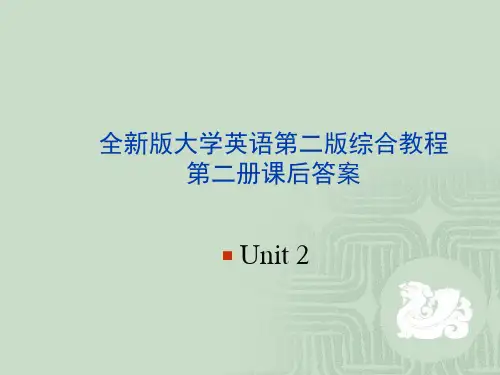
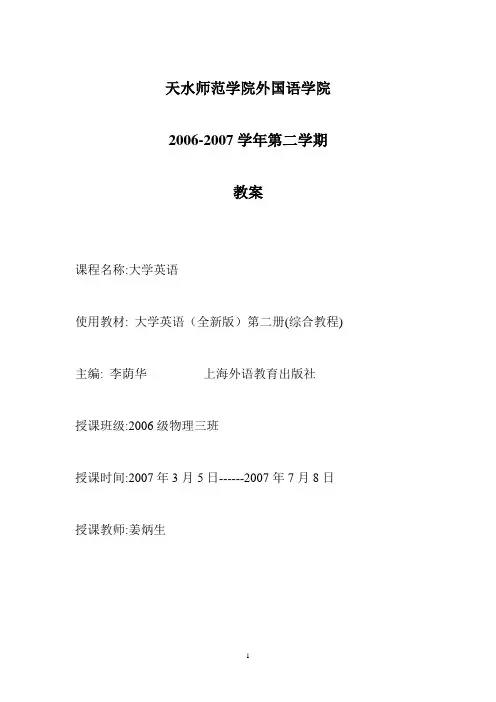
天水师范学院外国语学院2006-2007学年第二学期教案课程名称:大学英语使用教材: 大学英语(全新版)第二册(综合教程) 主编: 李荫华上海外语教育出版社授课班级:2006级物理三班授课时间:2007年3月5日------2007年7月8日授课教师:姜炳生Lesson Plan of College English Book IICourse Description:Course Objectives: The objective of College English is to develop students‘ ability to use English in an all-round way, especially in listening and speaking, so that in their future work and social interactions they will be able to exchange information effectively through both spoken and written channels, and at the same time they will be able to enhance their ability to study independently and improve their cultural quality so as to meet the needs of China‘s social development and international exchanges.Textbook:College English (Integrated Course 2, Listening and Speaking course 2 New Edition)Course Duration: from March 5th of 2007 to July 8th, 2007Teaching Hours: 4 hours each week (two hours is subtracted every week to enhance listening and speaking in the Multimedia Lab.Subjects of Teaching: 2006Class Three, Department of PhysicsTopics:Week 1: Integrated Course 2: Unit one Ways of LearningWeek 2: Listening and Speaking course 2: Unit 1 Sports, Unit 2 WeatherWeek 3: Integrated Course 2: Unit two ValuesWeek 4: Listening and Speaking course 2: Unit 3 Food and drinks, Unit 4 Health Week 5: Integrated Course 2: Unit Three The Generation GapWeek 6: Listening and Speaking course 2: Unit 5 Music, Unit 6 BusinessWeek 7: Integrated Course 2: Unit Four The Virtual WorldWeek 8: Listening and Speaking course 2: Unit 7 Fashion, Unit 8 SocietyWeek 9: Integrated Course 2: Unit Five Overcoming ObstaclesWeek 10: Listening and Speaking course 2: Unit 9 Unusual Happenings,Unit 10 DisastersWeek 11: Integrated Course 2: Unit Six Women, Half the skyWeek 12: Listening and Speaking course 2: Unit 11 Famous People, Unit 12 Invention Week 13 Integrated Course 2: Unit Seven Learning about EnglishWeek 14: Listening and Speaking course 2: Unit 13 Human Virtues, Unit 14 BiodiversityWeek 15 Integrated Course 2: Unit Eight Protecting Our EnvironmentWeek 16: Text Reciting Listening and Speaking course 2: Unit 15 Environment, Unit 16 InternetWeek 17: Oral ExaminationWeek 18: RevisionTeaching Format:This course uses a variety of learning methods: Lectures, collaborative tasks, group discussions and presentations.Required work for the students:Students are required to1.write a short essay every week2.do translation exercise of each unit3.recite at least two paragraphs of each text4.read at least 5000 words of reading materials that suit their levels5.have conversational oral practice with their roommates or classmates every day6.get up at 6:30 Am and read English every dayAssessment:Autonomous Learning through Internet: 10%, Test of each Unit: 10%, Students Performance in class: 10%, Homework and Text Reciting: 10%, Oral Exam: 10%, Final Exam: 50%Course Instructor: Jiang BingshengUNIT 1 Ways of LearningTeaching Objectives: Students are required to1.grasp the main idea (that it would be ideal if we can strike a balance between theChinese and Western learning styles) and structure of the text (introduction of the topic by an anecdote-elaboration by comparison and contrast—conclusion by a suggestion);2.appreciate the difference between comparison and contrast, as well as differentways to compare and contrast (point-by-point method or one-side-at-a-time method);3.master the key language points and grammatical structures in the textTeaching Procedures:Activity 1:1. Teacher asks students some questions.Q1: Is Learning a one-way street? (Parents and children should teach each other and learn from each other. Learning is a two-way interaction.)Q2: Can you guess what the theme of this unit, ways of learning, refers to? (Different people have different learning styles.)Activity 2:Teacher goes through the text with the students, helps them with words, phrases, sentences etc.New words and expressions1. attach: fasten or join (one thing to another)attach sth.to sth; eg. to attach a photo to a letter, be attached to sb./sth.eg. Most guys are attached to her beauty. attach importance to sb. /sth.eg. In English learning, people attach great importance to five basic skills. Namely, they are listening, speaking, reading, writing and translating as well.e.g. Scientists measure wind speed by attaching a wind meter to a kite and sending it up.e.g. You will find a copy of the document which is attached to this letter you asked for.2.not in the least: not at alle.g. I am not in the least touched by the Marilyn Monroe kind of beauty.e.g. Ann didn' t seem in the least concerned about her study.3.find one' s way: reach a destination naturally; arrive ate.g. Shanghai is not an easy city to find your way around.4.phenomenon:(pl.phenomena) sth.that happens or exists and that can be seen or experienced.e.g. Stress-related illness is a common phenomenon in big cities.e.g. Thunder and lightening are natural phenomena.5.initial: of or at the beginning, first(adj., used only before n.)e.g. Their initial burst of enthusiasm died down when they realized how much work the job involved.6. assist: help(used in the pattern: assist sb. To do sth, assist sb. with sth.)e.g. The professor was assisting his students to prepare their project.e.g. The college student decided to assist the boy with his study.7.somewhat: to some degree, a littlee.g. It is reported that conditions in the village have improved somewhat since November.8.await: (fml) wait forAwait is a fairly common word in formal writing, but you do not usually use it in conversation. Instead you use ―wait for.‖9. on occasion: now and thene.g. Steve spent almost all his time doing his research, but, on occasion, he would take his son to see a film.e.g. We must await the results of field studies yet to come.9.relevant: directly connected with the subject (followed by to, opposite irrelevant)e.g. Only a few people feel the debate about the cloning of human beings is relevant to their daily lives.10. on one’s own: a. without anyone‘s helpe.g. You needn‘t g ive me any help, I‘m able to manage on my own.e.g. I‘d rather not go to dance on my own. I do wish you‘d come with me.11. in due course: at the proper time; eventuallye.g. Your book will be published in due course.12. make up for: compensate fore.g. Her husband bought her a present to make up for quarreling with her the day before.13.view…as…:regard…as…14.in retrospect: on evaluating the past; upon reflectione.g. The young man knew in retrospect that he should have married his first love Emily.15. apply:a. be relevant (to sb./sth.); have an effect (used in the pattern apply to sb./sth.)e.g. The new pension arrangements won‘t apply to people born before 1960b. write a letter or fill in a form in order to ask formally for sth. (used in the pattern: apply for sth., apply to do sth.)e.g. We went to the sports club so often that we decided that we might as well apply to join.16.work at/on: try hard to achieve or improve (sth.);从事于/致力于e.g. John came back ahead of time to continue working on his thesis.at work:在工作priority: a. sth.that one must do before anything elsee.g. Being a qualified teacher is her first priority.b. sth. that holds a high place among competing claimse.g. The school will give priority to English and computer studies.17.evolve: (cause to) develop gradually (followed by into/from)e.g. The story evolves into a violent tragedy.Ss make sentences by means of ―evolve‖:通俗歌曲是由民歌演变而来。
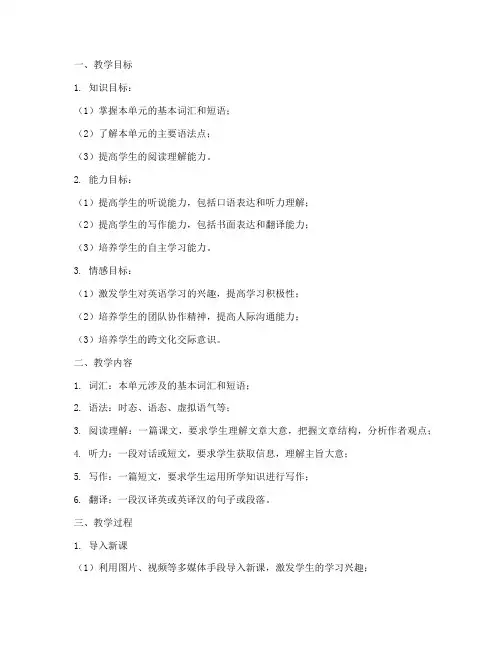
一、教学目标1. 知识目标:(1)掌握本单元的基本词汇和短语;(2)了解本单元的主要语法点;(3)提高学生的阅读理解能力。
2. 能力目标:(1)提高学生的听说能力,包括口语表达和听力理解;(2)提高学生的写作能力,包括书面表达和翻译能力;(3)培养学生的自主学习能力。
3. 情感目标:(1)激发学生对英语学习的兴趣,提高学习积极性;(2)培养学生的团队协作精神,提高人际沟通能力;(3)培养学生的跨文化交际意识。
二、教学内容1. 词汇:本单元涉及的基本词汇和短语;2. 语法:时态、语态、虚拟语气等;3. 阅读理解:一篇课文,要求学生理解文章大意,把握文章结构,分析作者观点;4. 听力:一段对话或短文,要求学生获取信息,理解主旨大意;5. 写作:一篇短文,要求学生运用所学知识进行写作;6. 翻译:一段汉译英或英译汉的句子或段落。
三、教学过程1. 导入新课(1)利用图片、视频等多媒体手段导入新课,激发学生的学习兴趣;(2)简单介绍本单元的主题和主要内容。
2. 词汇教学(1)展示本单元的基本词汇和短语,让学生自主阅读;(2)教师引导学生进行词汇的拼写、发音和用法练习;(3)进行词汇测试,巩固所学词汇。
3. 语法教学(1)讲解本单元的语法点,如时态、语态、虚拟语气等;(2)结合例句,让学生进行语法练习;(3)进行语法测试,巩固所学语法知识。
4. 阅读理解(1)学生自主阅读课文,了解文章大意;(2)教师引导学生分析文章结构,把握作者观点;(3)进行阅读理解测试,检验学生的学习效果。
5. 听力训练(1)播放对话或短文,让学生获取信息;(2)教师讲解听力技巧,引导学生进行听力练习;(3)进行听力测试,提高学生的听力水平。
6. 写作训练(1)教师讲解写作技巧,指导学生进行写作;(2)学生进行写作练习,教师批改并给予反馈;(3)进行写作测试,检验学生的写作能力。
7. 翻译练习(1)教师讲解翻译技巧,指导学生进行翻译练习;(2)学生进行翻译练习,教师批改并给予反馈;(3)进行翻译测试,提高学生的翻译能力。
教学目标:1. 培养学生阅读理解能力,使学生能够理解文章大意和细节。
2. 增强学生的词汇量和语法知识,提高英语综合运用能力。
3. 培养学生的听说能力,提高口语表达和听力理解水平。
4. 培养学生的写作能力,使学生能够撰写一篇结构完整、内容丰富的短文。
教学重点:1. 理解文章大意和细节。
2. 掌握文章中的关键词汇和语法结构。
3. 提高听说能力,能够进行简单的日常对话。
4. 提高写作能力,能够撰写一篇符合要求的短文。
教学难点:1. 理解文章中的复杂句型。
2. 掌握文章中的生僻词汇和短语。
3. 进行有效的口语表达和听力理解。
教学过程:一、导入新课1. 利用多媒体展示与文章主题相关的图片或视频,激发学生的兴趣。
2. 引导学生思考与文章主题相关的问题,如:What is the main idea of this article? What are the key points in this article?二、阅读理解1. 让学生快速阅读文章,了解文章大意。
2. 针对文章中的生僻词汇和短语进行讲解,帮助学生理解。
3. 让学生细读文章,回答问题,巩固阅读理解能力。
三、词汇和语法1. 教师讲解文章中的关键词汇和短语,让学生跟读并掌握。
2. 介绍与文章主题相关的语法知识,如:被动语态、虚拟语气等。
3. 学生进行相关练习,巩固所学词汇和语法知识。
四、听说训练1. 学生进行角色扮演,模拟文章中的场景,提高口语表达能力。
2. 教师播放听力材料,让学生回答问题,提高听力理解能力。
五、写作训练1. 教师讲解写作要求,如:文章结构、内容要求等。
2. 学生根据所学内容,撰写一篇短文,教师进行点评和指导。
六、课堂小结1. 回顾本节课所学内容,强调重点和难点。
2. 布置课后作业,如:阅读相关文章、完成写作练习等。
教学反思:1. 本节课通过多种教学方法,如:多媒体展示、角色扮演、听力训练等,激发了学生的学习兴趣,提高了他们的英语综合运用能力。
Unit 2 Values Teaching Aims: 1. Understanding the main idea (one can live a life full of riches without being rich funancially) and structure of the text 2. Appreciate the wording (riches) in the title of the text 3. Grasp the key languge points in Texts A and learn how to use them in context 4. Unerstand the cultural background related to the content 5. Express themselves more freely on the theme of Values after doing a series of theme-related reading, listening, speaking, and writing activities 6. Write an essay beginning with an anecdote or a piece of news, etc. Teaching Keypoints: 1. Grasp the main idea of Text A and language points in Text A 2. Cultural background in Text A 3. Analysis of the difficult sentences in Text A Teaching Difficulties: 1. Writing strategy and style demonstrated in Text A 2. Write an essay with an anecdote or a piece of news, etc. Teaching Aids: Teaching, dicussion, exercises, group-activities, student-centred Teaching period: 12classes Teaching Procedure: Step 1Warming up 1. Have students listen to the story about Abraham Lincoln before class, lead them to finish the exercises on page31, check the answer and explain. 2. Have students learn more about the fact that economic development and personal income can’t always account for happiness. 3. Do you think rich people must be happier than poor people? Why? 4. Do you think a poor person can have a life full of riches? How? 5. In class, students form two camps to debate the following issue: Mother Teresa has no money, but she took care of the poor in Calcutta until her death. Bill Gates gave a lot of money to charity, but he seldom works in the “frontline” with the poor. Does the world need more love like Mother Teresa’s or more money like Bill Gates’? Step 2 Global analysisi of Text A 1. Division of the Text A Part1: The writer’s encounter with a boy who raised the question “Are you poor?” Part2: In search of an answer the writer finds that not having expensive possessions doesn’t make him feel poor mainly because he enjoys life in many other ways. Part3: In conclusion, the writer thinks he’s grown to understand more about himself because of the boy’s question. 2. Understanding the main idea of the text with the help of the questions on page 37-38 Step 3. Detailed leaning of Text A 1. It was early December 2003, my first season as a Salvation Army bell ringer, when I was confronted with the question What does a Salvation Army bell ringer do? To ring the bell and ask people to donate money to help the poor. 2. confront: vt. 1) (of a problem, difficulty, etc.) face (sb.) threateningly The difficulties that confront us seem insuperable. A major difficulty that confronts international students is how best to judge the quality of a program in a foreign university 2) (of a person) face and deal with (a problem, difficulty, etc.) 军人必须面对危险和死亡。 A soldier has to confront danger and death. Astronauts have to confront the unknown be confronted with: be brought face to face The prisoner was confronted with his accusers. Conclusions that can be confronted with experience. 3. donation: n. money or goods given for a good cause The hospital receives a good deal of money in donations 他们对慈善事业慷慨捐助。 They made a generous donation to charity. Collocation: a blood donation 鲜血 make/give a donation 捐赠 promise a donation 允诺捐赠 4. confusion: n. a state of uncertainty about what sth. means, etc. The enemy retreated in great confusion. Their unexpected arrival threw our plan into confusion. 他们的突然到来打乱了我们的计划。 Collocation: in confusion 乱七八糟,处于混乱状态 throw into confusion使狼狈,使慌乱 : n. a strong desire to know about sth. We burned with curiosity over what was in the box. Just to satisfy my curiosity, how much did you pay for your car? from/out of curiosity在好奇心驱使 Curiosity killed a cat. 好奇伤身 : v. speak with a tendency to repeat rapidly the same sound or syllable It’s cruel to make fun of people who stammer. 7. deny: vt. 1) say that sth. is not true There is no denying the fact that Japan began to invade China as early as the early 1930’s. 2) refuse to admit or accept He denied knowing anything about their plans. 8. fall into: belong to (a particular group of things that have similar qualities) All whales fall into two groups, those with teeth and those without. 9. nothing more than: only, just Happiness is nothing more than good health and a bad memory. 这只不过是个杜撰的故事而已。 It is nothing more than a made-up story. 10. attain: vt. succeed in achieving, esp. after a lot of effort I’m determined to attain my purpose at any cost. She attained her ambition of becoming a pilot. Collocation: attain one’s goal 达到目的 attain the age of有…岁 attain the top of a moutain到达山顶 11. cherish: vt. love (sth./sb.) very much and protect them Riding horses with my mother when I was a kid has become a cherished memory. She cherished the child as though he were her own. Collocation: cherish fond dreams of 做…的美梦 cherished desire 夙愿 cherish a deep love for热爱… 12. tickle: v. 1) amuse and interest The comedian tickled the crowd with his jokes. It tickled her to think that her boss would dress up as a clown at the New Year party. 2) move one’s fingers on a sensitive part of another’s body in a way that makes them laugh She tickled the boy’s feet and made him laugh. 婴儿喜欢呵痒和拥抱。 Babies like to be tickled and hugged. 13. vital: adj. very important, necessary, or essential This point is vital to my argument. The leader’s vital and cheerful manner filled his men with courage. be vital to … 对…极为重要 14. well off: rich, or having enough money to live well The Communist Party of China will lead the Chinese people in building a well-off society. If he had worked harder when young, he would be well off now. 如果他年轻时多努力一点,现在就能过得舒服些。 15. pursuit: n. the act of looking for or trying to find We work hard in pursuit of happy life. He exercises every day in pursuit of health.